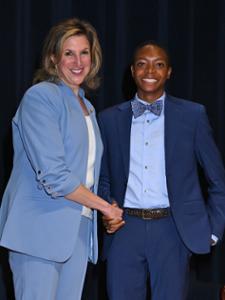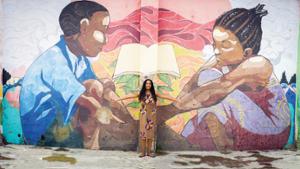Fellowship Advising
The Office of Student Fellowship helps Hamilton students and recent alumni connect with transformative experiences and opportunities.
-
Fellowship Advising
Students work with the Director to identify and apply for nationally competitive opportunities.Join Us!
Check out the upcoming information sessions and events offered by the Fellowships Advising. -
International Summer Research Funding
Hamilton’s new program supports students who wish to conduct summer research outside the U.S.Frequently Asked Questions
Who should consider applying? When should I start the process? What makes a strong application? -
Recent Award Recipients
Each year our students compete favorably for some of the country’s most prestigious fellowships.
Recent Fellowship Award Winners
Sabina Feder ’25
William M. Bristol Fellowship
Feder, a food studies major, took classes in literature, anthropology, and environmental science to create her own interdisciplinary major at Hamilton and prepare for her project “Waste Not: Local Initiatives Against Global Food Waste.” She will visit New Zealand, the Bahamas, the Netherlands, and Sweden.
Andrew Fredericks ’25
Thomas J. Watson Fellowship
Fredericks’ Watson will take him to countries with exciting human evolutionary discoveries: Germany, Georgia, and Kenya for their fossil sites of early hominins, and Brazil for its population of chimpanzees that have developed a unique ability to use tools.
Charlie Haberstock ’25
Thomas J. Watson Fellowship
Haberstock’s Watson project will take him to some of the most isolated towns in Canada, Finland, Greenland, and Tristan da Cunha, the world’s most remote inhabited island. He plans to study the issues faced by remote economies as globalization leads to a dangerous feedback loop of economic depression and depopulation.
Naval Lappalainen ’25
Critical Language Scholarship
Naval Lappalainen ’25, a double major in history and Russian studies, from Wilmington, Del., will study in Kyrgyzstan.
Xavier McMahon ’27
Critical Language Scholarship
Xavier McMahon ’27, a double major in world politics and Russian studies from Louisville, Kentucky, will be based in Daugavpils, Latvia.
Quentin Messer ’26
Harry S. Truman Scholarship
A world politics concentrator, Messer plans to pursue a J.D. and Master’s in Public Administration (MPA) following graduation. He is Hamilton’s third recipient of the prestigious award following Dewayne Martin ’24 and Frederick Nelson ’78.
Yuxuan Xu ’26
Goldwater Scholarship
Xu is currently spending the semester at the Marine Biological Laboratory in Woods Hole, Mass., where he’s exploring how marine organisms can reveal insights into human biology. His time at Woods Hole has him excited for a future in science; he has ambitions to earn a Ph.D. in neuroscience, the inspiration for which he attributes to Professor of Biology Emeritus Herman Lehman.
More Fellowships News

Two Geosci. Majors. Two Passion Projects. Two Watson Fellowships
Andrew Fredericks ’25 and Charlie Haberstock ’25 both received a 2025 Thomas J. Watson Fellowship, a national $40,000 grant to pursue a one-year passion project anywhere in the world. While receiving the award is a feat in and of itself, the two geosciences majors were particularly excited when they heard that the other had won. Close friends since their first year at Hamilton, the pair had supported each other throughout the Watson application process.

Bristol Recipient Ratner ’23 Returns to Share His Story
Individuality. Creativity. Collaboration. Dependence. To Charlie Ratner ’23, lacrosse has always provided the perfect blend of striving for success both as an individual and working together as a cohesive team. These qualities have been the building blocks of Ratner’s life; in fact, he describes his lacrosse stick as an inherent part of his very being.

Hamilton Again a Top Fulbright Producer
For the 21st consecutive year, Hamilton has been recognized among the colleges and universities with the most students selected for the Fulbright U.S. Student Program.
Contact
Office / Department Name
Student Fellowships
Contact Name
Lisa Grimes
Director of Student Fellowships








